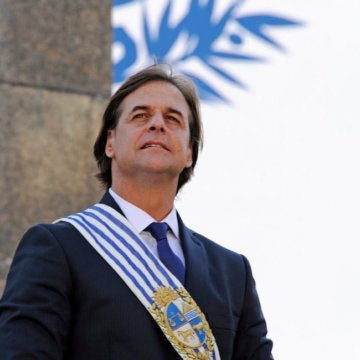- About
- Topics
- Picks
- Audio
- Story
- In-Depth
- Opinion
- News
- Donate
- Signup for our newsletterOur Editors' Best Picks.Send
Read, Debate: Engage.
| topic: | Election |
|---|---|
| located: | Uruguay, Brazil, USA |
| editor: | Ellen Nemitz |
March 1st is the beginning of a new era for Uruguayan politics. After 15 years of the left-wing coalition Frente Amplio leading the southern Latin American country, it is time for the right-wing Luis Lacalle Pou to sit in the presidential chair.
He will assume a country with stagnant economic growth rates – in 2010 the country reached a 7.8 per cent GDP increase, while in 2018 it was 1.62 per cent. In one decade, Tabaré Vázquez and José Mujica were responsible for pulling down poverty rates from almost 33 per cent to less than 8 per cent, according to the World Bank. The inflation rate, however, has been fluctuating and today is higher than it was 15 years ago. Unemployment has been decreasing from 2005 to 2012, and since then the curve is ascendent.
Seeing all these numbers can lead one to compare Uruguay to Brazil. Indeed, the situations are comparable: a long period of leftist governments, millions out of poverty, an economic boom which has been recently declining and a society susceptible to speech promising changes for better.
Similarly as Brazil for the two past years, economic development and public security are priorities to the new government of Uruguay. For these purposes, the president finds in the United States of Donald Trump an important ally: even before the mandate inauguration, Lacalle Pou met the Under Secretary of State for Political Affairs, Mr David Hale, to discuss "the strong US-Uruguay partnership and steps to strengthen our promotion of democracy, economic growth and security for our countries and the region”, as tweeted the US Department of State. One more time, here we can find similarities to Brazil, as Jair Bolsonaro has been discussing with Trump economic partnerships and even changed Visa requirements for Americans.
Locally, the strategy is to change policies as soon as possible. One of the very first acts will be the Urgent Bill, which proposes many changes in areas such as public security, education, economic and public companies, labour relations and social security, among others. Lacalle Pou justified it, saying that “in Uruguay there are things to be done urgently”, and that waiting for a regular bill is not possible.
Regarding public security, once more a similarily to Brazil, the aim is to harden laws against crime: “we are saying to the police: support and respect. To the criminals: the law”, said Jorge Larrañaga, future head of Interior Ministry, declaring support to a “strong hand” policy against crime and investments in police weaponry. Also following in the Brazilian path, Uruguay will most likely witness in the near future reforms on taxes, social security and public enterprises.
Some politician statements are worrying as well: the future Minister of Defense, Rivera Elgue, said that "if the army 'would have acted badly' during dictatorship [from 1973 to 1985], 'there should have been more missing people'”. Months ago, Juan Cardoso, a politician later banned from the far-right party Cabildo Abierto, said that it would be necessary to have a “death squad” to “clean the country”.
José Mujica, former president from 2010 to 2015 and now Senator, once declared that there would not be the kind of opposition with “one stone in each hand”, but a constructive one. Despite this, he recently declared that right-wing coalitions are “operating a methodology that is being seen in Latin America” and assessed: "The most conservative forces have always presented themselves with a halo of morality and then they are the most rotten thing that ever existed. It has always been that way throughout history”.
Image: Facebook
